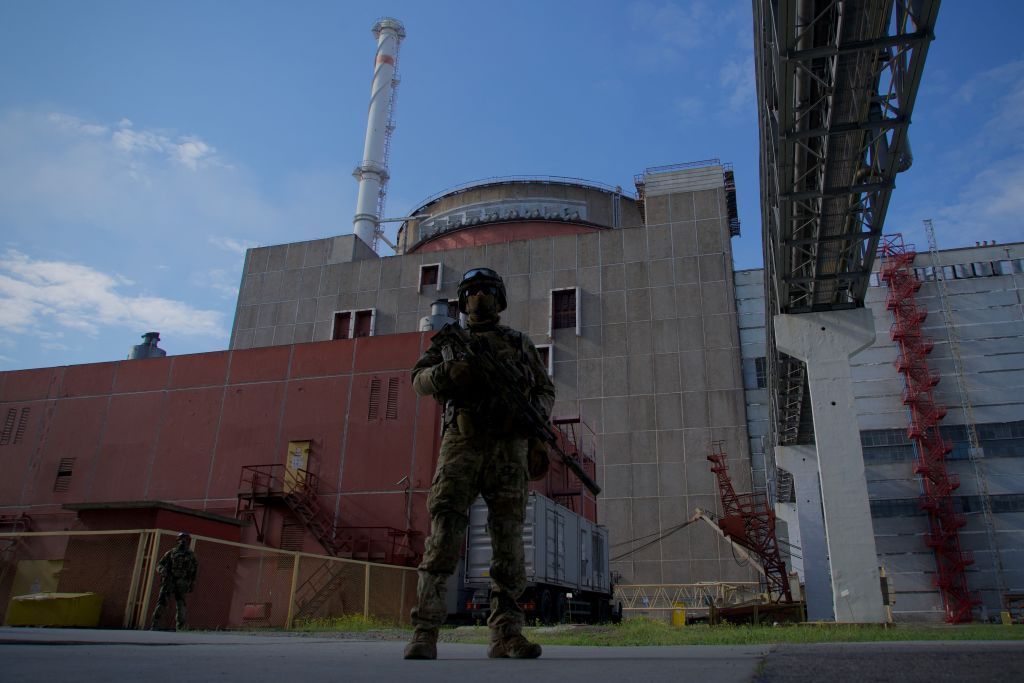Ukraine’s military intelligence agency denied involvement in the explosion of a drone at the Zaporizhzhia Nuclear Power Plant, stating that Russia was behind the incident as part of a frequent tactic of false flag strikes. The spokesperson emphasized that Russian actions endangered the nuclear facility and called for the withdrawal of Russian troops from all ZNPP facilities to restore compliance with international norms. The International Atomic Energy Agency was informed by the nuclear plant of the drone detonation, but did not specify the responsible party. The Zaporizhzhia Nuclear Power Plant, Europe’s largest nuclear plant, has been under Russian occupation since March 2022.
The incident at the Zaporizhzhia Nuclear Power Plant highlights the ongoing tensions and conflicts in Ukraine, with Russia accused of endangering important nuclear energy facilities through false flag strikes and military occupation. The denial of involvement by Ukraine’s military intelligence agency points to a complex and volatile situation, with international organizations such as the IAEA closely monitoring the events. The need for compliance with international norms and the removal of Russian troops from the nuclear plant’s facilities is critical to ensure the safety and security of such vital infrastructure.
The involvement of drones in the attack on the Zaporizhzhia Nuclear Power Plant raises concerns about the use of advanced technology in armed conflicts and the potential risks to critical infrastructure. The detonation of a drone on the site underscores the vulnerabilities faced by nuclear facilities in conflict zones, requiring increased vigilance and security measures to prevent further incidents. The IAEA’s involvement in investigating the drone detonation reflects the importance of international cooperation and oversight in monitoring and addressing threats to nuclear plants.
The ongoing conflict in Ukraine, especially the situation at the Zaporizhzhia Nuclear Power Plant, underscores the need for independent journalism to provide accurate and reliable information to the public. By supporting independent journalism in Ukraine, individuals can contribute to efforts to shed light on complex issues and hold accountable those responsible for actions that endanger nuclear facilities and civilian populations. Joining the fight to support independent journalism can help amplify voices that are crucial in increasing transparency and accountability in conflict situations.
The implications of the drone detonation at the Zaporizhzhia Nuclear Power Plant extend beyond the immediate incident, highlighting the broader security challenges faced by Ukraine and the region. The threat of false flag strikes and military occupation of critical infrastructure points to the ongoing risks and tensions in the conflict between Ukraine and Russia. Efforts to address these challenges, including calls for the withdrawal of Russian troops and adherence to international norms, require sustained attention and cooperation from the international community.
In conclusion, the drone explosion at the Zaporizhzhia Nuclear Power Plant underscores the complex and volatile nature of the conflict in Ukraine, with Russia accused of endangering the facility through false flag strikes. The involvement of drones in the attack raises concerns about the use of advanced technology in armed conflicts and the vulnerabilities faced by critical infrastructure. Support for independent journalism in Ukraine is crucial to ensure transparency and accountability in reporting on such incidents and to shed light on the challenges faced by the country. Efforts to address the security threats posed by the conflict, including the withdrawal of Russian troops and compliance with international norms, require sustained attention and cooperation from the international community.


